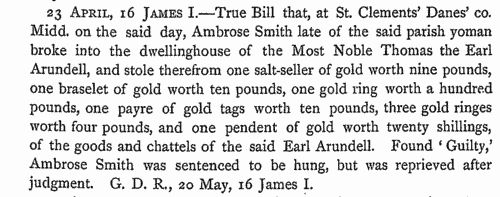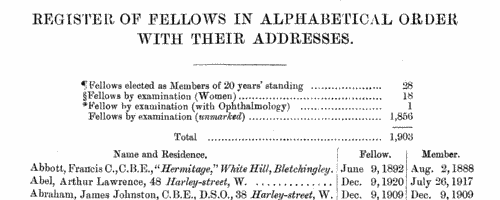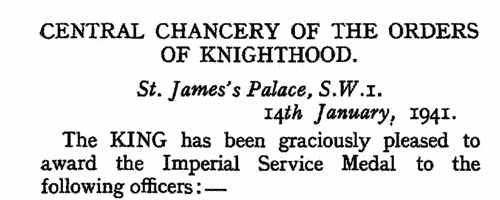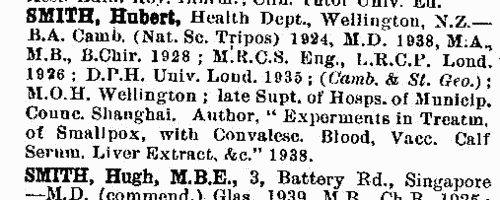Durante Surname Ancestry ResultsOur indexes 1000-1999 include entries for the spelling 'durante'. In the period you have requested, we have the following 11 records (displaying 1 to 10): Buy all | | | Get all 11 records to view, to save and print for £50.00 |
These sample scans are from the original record. You will get scans of the full pages or articles where the surname you searched for has been found. Your web browser may prevent the sample windows from opening; in this case please change your browser settings to allow pop-up windows from this site. Devon and Cornwall clerks, clerics, monks and clergy
(1370-1382)
Ordinations to first tonsure, acolytes, subdeacons, deacons and priests, from the register of bishop Thomas de Brantyngham of Exeter. Exeter diocese covered the counties of Cornwall and Devon. Some of these clerks would go on to obtain benefices and remain celibate. The lists of subdeacons, deacons and priests state the clerks' respective titles, i. e., give the names of the person or religious house undertaking to support them. Monks and friars ('religious') are bracketed separately as such.DURANTE. Cost: £6.00.  | Sample scan, click to enlarge

| Tenants, founders and incumbents of Yorkshire chantries
(1546-1548)
Chantries were established to perform services for the souls of their founders and other faithful dead, including annual obits and anniversaries at which alms were usually distributed. The chantries could be at an existing altar in a parish church, a new altar in a side chapel of an existing church, in a new chapel in the churchyard or some miles from an existing church: few were founded before 1300, and most date from 1450 to 1500. Hospitals were places provided by similar foundations to receive the poor and weak; there were also religious guilds, brotherhoods and fraternities, and colleges (like large chantries at which three or more secular priests lived in common). An Act of Parliament of 1545 gave king Henry VIII the power to dissolve such chantries, chapels, &c., the proceeds to be devoted to the expenses of the wars in France and Scotland. Commissioners were appointed 14 February 1546 to survey the chantries and seize their property, and from 1546 to 1548 the commissioners produced these certificates giving brief details of the establishment and nature of each foundation, with an inventory of valuables and rental of lands. The individuals named in the certificates are thus the founder, the present incumbent, and the tenants whose rents provided the chantry's income. All the surviving certificates were edited by William Page for the Surtees Society, and published from 1892.DURANTE. Cost: £6.00.  | Sample scan, click to enlarge

| Traders in Canterbury
(1392-1592)
No man or woman could trade in the city of Canterbury without having obtained 'freedom' of the city, unless they paid an annual fee to do so. Admissions of freemen were recorded on the Chamberlains' Accounts of the city, which were prepared annually from Lady Day (25 March) to Lady Day until 1752, and thereafter each set runs from 1 January to 31 December. The accounts for 1392 are incomplete, but thereafter until 1800 there is a complete series except for the years 1455 to 1457 and the year 1552-3. Joseph Meadows Cowper, Honorary Librarian to the Corporation, transcribed and privately printed in 1904 the lists of the Intrantes - those persons, not being free of the city, who paid the annual fine to trade - for the period 1392 to 1592. The names are arranged by ward (Burgate, Newyngate, Westgate, Worgate and Northgate, and give full name, (sometimes) occupation, and fee paid. DURANTE. Cost: £4.00.  | Sample scan, click to enlarge

| Secretary of State's Papers
(1599)
The letters and papers of sir Robert Cecil, Secretary of State, deal with all manner of government business in England, Ireland and abroad.DURANTE. Cost: £4.00.  | Sample scan, click to enlarge

| Middlesex Sessions
(1603-1625)
Incidents from the Middlesex Sessions Books. These are abstracts of sessional orders, minutes of criminal cases, memoranda and other entries of record taken from the three volumes of Gaol Delivery Register, four volumes of Sessions of Peace Register and two volumes of Process Books of Indictments for the county of Middlesex from the reign of king James I. The references at the end of each item indicate the volume in question, the abbreviations being G. D. for Gaol Delivery, S. P. for Sessions of Peace, and S. O. T. for Session of Oyer and Terminer; occasionally preceded by S. for Special or G. for general, or followed by R. for Roll or Reg. for Register. It should be noted that, in the case of 'true bills' or indictments, the abstract starts with the date on which the offence took place, the date of the conviction &c. being at the end of the entry.DURANTE. Cost: £4.00.  | Sample scan, click to enlarge

| Official Papers
(1683)
The State Papers Domestic cover all manner of business relating to Britain, Ireland and the colonies, conducted in the office of the Secretary of State as well as other miscellaneous records. This covers June to September 1683.
DURANTE. Cost: £4.00.  | Sample scan, click to enlarge

| Medical practitioners qualified in Britain or Ireland but living abroad
(1926)
The Medical Directory was split into several sections. The Practitioners Resident Abroad section covered all medical practitioners who, having qualified in Britain or Ireland or otherwise registered under the medical Acts of Great Britain and Ireland, were living abroad. Each year a schedule was sent to each doctor to be returned to the publishers, so as to keep the directory up to date. In the directory the doctor's name is given first, in bold, surname first, in capitals; then current address. Next are the qualifications; the italic abbreviations in parentheses following the qualifications indicate the medical school at which they were gained. Then there is a list of posts and honours within the profession, starting with those then current; previous posts are preceded by the word 'late'. Finally, brief details are given of any publications. DURANTE. Cost: £4.00.  | Sample scan, click to enlarge

| Surgeons
(1928)
The Royal College of Surgeons, established by royal charters, issued this calendar 1 August 1928, including official lists of all its fellows, members, licentiates and diplomates. The register of fellows gives full name (surname first) and address (in italics), with dates of admission as fellow and member. The list of members gives year of admission, full name (surname first) and town or country of residence. The lists of licentiates give year of admission and full name, but no indication of current address: entries of fellows of the college are prefixed with a double dagger, those of members with an asterisk. The lists of diplomates give year of admission and full name (surname first), with those diplomates who were neither members nor fellows of the college indicated with a dagger. This is the index to the members.DURANTE. Cost: £6.00.  | Sample scan, click to enlarge

| Imperial Service Medal
(1941)
The Central Chancery of the Orders of Knighthood at St James's Palace announced these awards by king George VI of the Imperial Service Medal to members of the Home Civil Service. The names are arranged alphabetically by surname (in capitals) and christian names, with office or rank in the service.DURANTE. Cost: £6.00.  | Sample scan, click to enlarge

| Doctors trained in Britain or Ireland but living abroad
(1948)
The Medical Directory was split into several sections. The Practitioners Resident Abroad section covered all medical practitioners who, having qualified in Britain or Ireland, were living abroad. Each year a schedule was sent to each doctor to be returned to the publishers, so as to keep the directory up to date. In the directory the doctor's name is given first, in bold, surname first, in capitals; then current address. Next are the qualifications; the italic abbreviations in parentheses following the qualifications indicate the medical school at which they were gained. Then there is a list of posts and honours within the profession, starting with those then current; previous posts are preceded by the word 'late'. Finally, brief details are given of any publications. Inclusion of names in the list did not imply a right to practise in the country of residence.DURANTE. Cost: £2.00.  | Sample scan, click to enlarge

|
| 1 | 2 |  |
Research your ancestry, family history, genealogy and one-name study by direct access to original records and archives indexed by surname.
|












